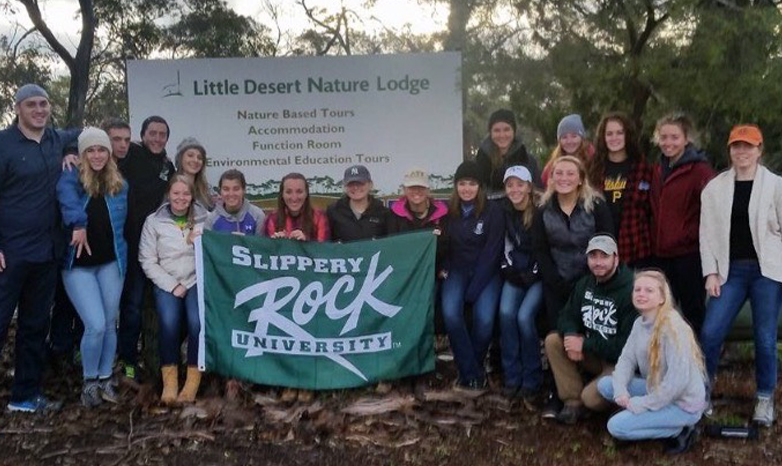SRU students head ‘down under’ on conservation mission

Robert Snyder, Slippery Rock University professor of elementary education and early childhood, and a group of SRU students show off The Rock’s colors at Little Desert Nature Lodge in Victoria, Australia. The team joined an International Student Volunteers mission to plant 11,400 trees, clear 1,715 meters of walking trail and remove 1,000 meters of rusty fences. (Submitted photo)
Aug. 10, 2016
SLIPPERY ROCK, Pa - "Life begins at the edge of your comfort zone," New York Times best-selling author Michael Hyatt admonishes. Sometimes you have to stretch yourself and push past barriers - real or perceived to succeed.
Take Erica Burnworth, a Slippery Rock University senior biology major from Greenville, for example. She made the decision to push herself to the edge of her comfort zone by leaping, not into a vacation, but a life-changing experience.
Within the past month, Burnworth has done everything from snorkeling in the Great Barrier Reef to rappelling in the Blue Mountains of Sydney. She has survived 14 hours of jet lag, endured an Australian winter in a sleeping bag and camped in a desert 20 miles from the nearest civilization.
But beyond these adventures that tested her personal endurance and energy, Burnworth demonstrated she is more than an adrenaline junkie. She is a volunteer and an environmentalist who flew halfway across the world for a globe-changing cause.
Burnworth spent two weeks of her summer with the International Student Volunteers in the Little Desert National Park in the Western District of Victoria, Australia as a member of a conservation-driven effort.
"It's doing the little things in life that make a big difference," said Burnworth. "That's what I was out there to do."
Led by chaperone Robert Snyder, SRU professor of elementary education and early childhood, Burnworth and 15 other SRU students joined an ISV mission to plant 11,400 trees, clear 1,715 meters of walking trail and remove 1,000 meters of rusty fences.
Joining 36 other students from across the state and nation, Burnworth and the SRU team participated in the ISV's mission to "support sustainable development initiatives around the world through life-changing student volunteer programs designed to positively change our world and to educate, inspire and result in more active global citizens".
The ISV, the world's highest rated volunteer program, has conducted international travel programs for 30 years, transporting more than 35,000 college and high school students to countries covering six continents for conservation and community development projects. Recent global achievements with the ISV have included more than 27,000 logged hours of teaching impoverished children basic educational courses, more than 26,000 hours of surveying and monitoring endangered species and collecting nearly 14,000 trash materials.
This particular Australian assignment was an ISV partnership with Conservation Volunteers Australia, a program with active goals in managing a healthy, diverse and stable environment and in inspiring environmentally conscious communities. In keeping with these visions, Burnworth and the SRU contingent was charged to "rewild the desert".
"Everything that we did served a specific purpose," said Burnworth. "We removed fences because kangaroos were getting tangled in the barbed wire. Clearing the tracks for motor vehicles will allow scientists and professionals to reintroduce species to the area and the trees we planted were specially handpicked to shelter endangered birds like the red-tailed black cockatoo."
According to Conservation Volunteers, the depression of native species is more threatening than ever with 31 percent of Australian mammals and 14 percent of Australian birds either extinct or critically endangered.
Reversing these trends requires nothing less than radical "living on the edge".
"Everything that we did was a struggle," said Burnworth. "During the day, we were out shoveling and planting until we were sore. Then, we would return at night to an outdoor kitchen and sleeping bags."
"It was pretty hardcore, but it was a game changer."
Many of Burnworth's fellow classmates and volunteers also described the experience of volunteering under these conditions in life altering terms.
"This was one of the most eye opening and life changing experiences I've ever had," said Alyssa Ekas, a junior public health major from Bradford.
"It was so rewarding to get so much done during the volunteering portion of our trip, planting over 11,000 trees," said Andrew Betzold, a senior physics major from Pittsburgh.
While the desert projects consumed half of the ISV expedition, the remaining time consisted of an "adventure tour", which allowed the tired environmentalists to rejuvenate during a grand tour across Australia.
The team enjoyed white water rafting, bungee jumping, rappelling, snorkeling and visiting iconic sites including the Opera House of Sydney, Harbor Bridge, Fraser Island and Byron Bay before returning from down under to Western Pennsylvania August 5.
MEDIA CONTACT: Maizee Zaccone | 724.738.2091 | mxz1016@sru.edu

